|
|
|
Sort Order |
|
|
|
Items / Page
|
|
|
|
|
|
|
| Srl | Item |
| 1 |
ID:
130681
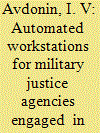

|
|
|
|
|
| Publication |
2014.
|
| Summary/Abstract |
The article examines trends in workstation use by military investigators engaged in crime detection and investigation. It explored algorithms to maximize automated workstations (AWS) potential in the work of detecting and investigating crimes. Trends in using AWS discussed include legal information systems used by the U.S., Great Britain, and Italy as well as software programs and sharing of electronic documents by investigator, head of the agency, prosecutor and the expert.
|
|
|
|
|
|
|
|
|
|
|
|
|
|
|
|
| 2 |
ID:
132128
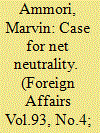

|
|
|
|
|
| Publication |
2014.
|
| Summary/Abstract |
For all the withering criticism leveled at the White House for its botched rollout of HealthCare.gov, that debacle is not the biggest technology-related failure of Barack Obama's presidency. That inauspicious distinction belongs to his administration's incompetence in another area: reneging on Obama's signature pledge to ensure "net neutrality," the straightforward but powerful idea that Internet service providers (ISPs) should treat all traffic that goes through their networks the same. Net neutrality holds that ISPs shouldn't offer preferential treatment to some websites over others or charge some companies arbitrary fees to reach users. By this logic, AT&T, for example, shouldn't be allowed to grant iTunes Radio a special "fast lane" for its data while forcing Spotify to make do with choppier service.
|
|
|
|
|
|
|
|
|
|
|
|
|
|
|
|
| 3 |
ID:
149829


|
|
|
|
|
| Summary/Abstract |
China's Coast Guard has drawn attention for its activities in the South and East China seas. Neil Ashdown and Sebastian Czakon examine how structured monitoring of historical data from vessel location broadcasts can be used to analyse marine activity.
|
|
|
|
|
|
|
|
|
|
|
|
|
|
|
|
| 4 |
ID:
170611
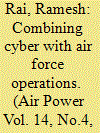

|
|
|
| 5 |
ID:
139190
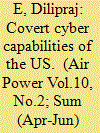

|
|
|
|
|
| Summary/Abstract |
Though declared as the global common by the world, it is an undeniable fact that internet technology was conceived, developed, and nurtured in the US during the second half of the 20th century. In other words, the US was the cradle for cyber technology, especially the internet, which is currently the backbone of the global communication network. In fact that, the internet is still indirectly governed by US laws which are secretly amended at times to be in tune with its national interest.
|
|
|
|
|
|
|
|
|
|
|
|
|
|
|
|
| 6 |
ID:
130920
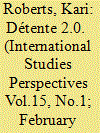

|
|
|
|
|
| Publication |
2014.
|
| Summary/Abstract |
This paper asks whether the recent "reset" in Russia-US relations parallels the Cold War reprieve from East to West tensions during Détente. The author considers the enthusiasm for this reset shared by Presidents Medvedev and Obama and acknowledges the benefits accrued for Russia as a result of better relations with the United States. In so doing, the paper argues that the Medvedev-Obama reset is not the result of a convergence of liberal-minded principles shared by the leadership, due in large part to the absence of a meaningful commitment on the part of Medvedev to bring about meaningful liberal reforms in Russia. In fact, the reset seems more the result of a desire by both leaders to shed past ideological disagreements in favor of a more pragmatic approach to relations, based upon mutual benefit. The paper then concludes that the current reset is not a temporary warming of relations akin to a second-generation détente because there was no "new Cold War" to abate. The paper contributes to the growing body of opinion that acknowledges a need for analysts and practitioners to search for a better lens through which to view Russia-US relations than the Cold War prism that persistently frames our analysis.
|
|
|
|
|
|
|
|
|
|
|
|
|
|
|
|
| 7 |
ID:
125362


|
|
|
|
|
| Publication |
2013.
|
| Summary/Abstract |
As awareness of the need for online privacy grows, technology is increasingly becoming available to help internet users maintain anonymity, Robert Pritchard investigates illegal activities facilitated by such technology and the inherent problems in tacking it.
|
|
|
|
|
|
|
|
|
|
|
|
|
|
|
|
| 8 |
ID:
132330
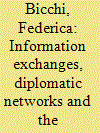

|
|
|
|
|
| Publication |
2014.
|
| Summary/Abstract |
This article analyses how, within the European Union foreign policy system, information is gathered and knowledge is constructed. The analysis is based on the evidence provided by a unique dataset, comprising the Heads of Mission reports between 1998 and 2010 and the EU member states' diplomatic networks. After distinguishing between information and knowledge, the article tackles three related aspects. First, it shows that the EU is able not only to favour information exchanges, but also to gather information and construct knowledge. Second, it argues that, while member states have an interest in contributing their own information and knowledge, European knowledge is also possible. This is demonstrated by means of an in-depth analysis of the preparation of the Heads of Mission report on East Jerusalem. Third, the article suggests that, depending on the reach of their diplomatic network, some member states are interested more than others in European information, but all member states are interested in European knowledge and in each other's interpretation of current affairs
|
|
|
|
|
|
|
|
|
|
|
|
|
|
|
|
| 9 |
ID:
046580
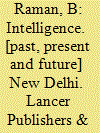

|
|
|
|
|
| Publication |
New Delhi, Lancer Publishers & distributors, 2002.
|
| Description |
x, 416p.
|
| Standard Number |
8170622220
|
|
|
|
|
|
|
|
|
|
|
|
Copies: C:1/I:0,R:0,Q:0
Circulation
| Accession# | Call# | Current Location | Status | Policy | Location |
| 045450 | 327.12/RAM 045450 | Main | On Shelf | General | |
|
|
|
|
| 10 |
ID:
130882
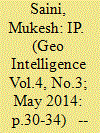

|
|
|
|
|
| Publication |
2014.
|
| Summary/Abstract |
Cyber warfare is very similar in nature to naval warfare. In international waters, navy encounters enemy warships, large merchant vessels, small merchant ships, fishing boats and guised surveillance ships from all directions. There are no borders to clearly establish that everything on the other side belongs to enemy. Though there are Sea-Lanes-of-Communication (SLOC) but two ports are actually on connectionless service and no ship is bound to follow SLOC. In cyberspace, IP address is the flag which every asset on the Internet displays but ruse is not uncommon. It is therefore necessary to identify the cyber assets positively in any cyber-conflict before any aggressive response is initiated. Wearing flag of convenience is common for sea vessels as well as cyber assets.
|
|
|
|
|
|
|
|
|
|
|
|
|
|
|
|
| 11 |
ID:
132535
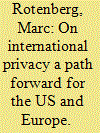

|
|
|
|
|
| Publication |
2014.
|
| Summary/Abstract |
The United States and its closest allies may be on a collision course over the future of privacy in the networked world. Whether leaders are able to find a policy solution will require that they understand the significance of the recent NSA disclosure as well as the development of modern privacy law. Long before a former NSA contractor spilled the secrets about the scope of the NSA's global surveillance, foreign governments worried about the ability of the United States to monitor those living in their countries. The increasing automation of personal information and the technological advantage that the United States enjoyed over other nations was already seen as a problem in the late 1960s. The concerns only increased as Internet-based commerce gave rise to the vast collection and storage
|
|
|
|
|
|
|
|
|
|
|
|
|
|
|
|
| 12 |
ID:
130907
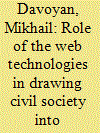

|
|
|
|
|
| Publication |
2014.
|
| Summary/Abstract |
In recent years, it has becomes vitally important to draw civil society into international relations. Indeed, deeper international integration is impossible without a direct involvement of the business community NGOs and public movements in the processes which will produce shared ideas about future integration an establish authentic operational feedback.
|
|
|
|
|
|
|
|
|
|
|
|
|
|
|
|
| 13 |
ID:
133729
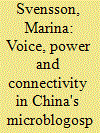

|
|
|
|
|
| Publication |
2014.
|
| Summary/Abstract |
This article addresses the issue of who has a voice on microblogs in China and what having a voice in the age of social media actually means. In theory, microblogs have a low threshold and are easy to use, thus enabling more Chinese citizens to articulate their concerns as well as paving the way for interactivity among different groups of people. In reality, however, not all citizens are as likely to use microblogs or be heard through them. Although microblogging practices have spread from the technology-savvy early adopters to broader groups in society, one should not assume that microblogs have helped bridge the information gap among China's ICT users, or empowered everybody in equal measure. This article discusses the demographics of microblog users, addressing diffusion patterns, number and range of followers, as well as topics discussed and how these are shaped by microbloggers of different socio-economic status. It makes use of and synthesizes existing surveys and previous studies in the field, while also building on this author's qualitative and ethnographic research on journalists and migrant workers. The article also addresses the 2013 crackdown on opinion leaders on microblogs and its implications for public debates and connectivity on social media.
|
|
|
|
|
|
|
|
|
|
|
|
|
|
|
|
| 14 |
ID:
051902
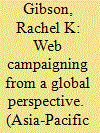

|
|
|
|
|
|
|
|